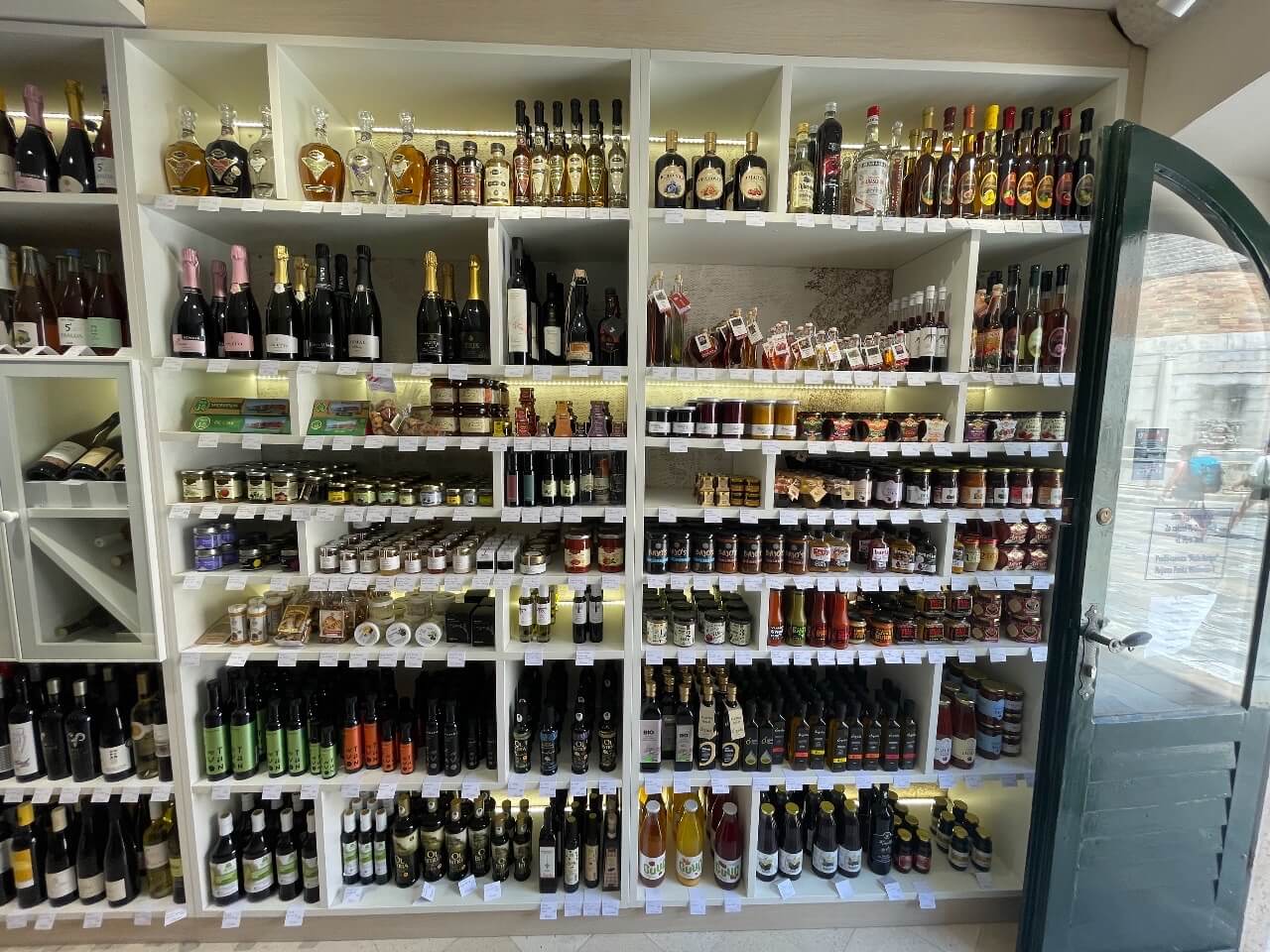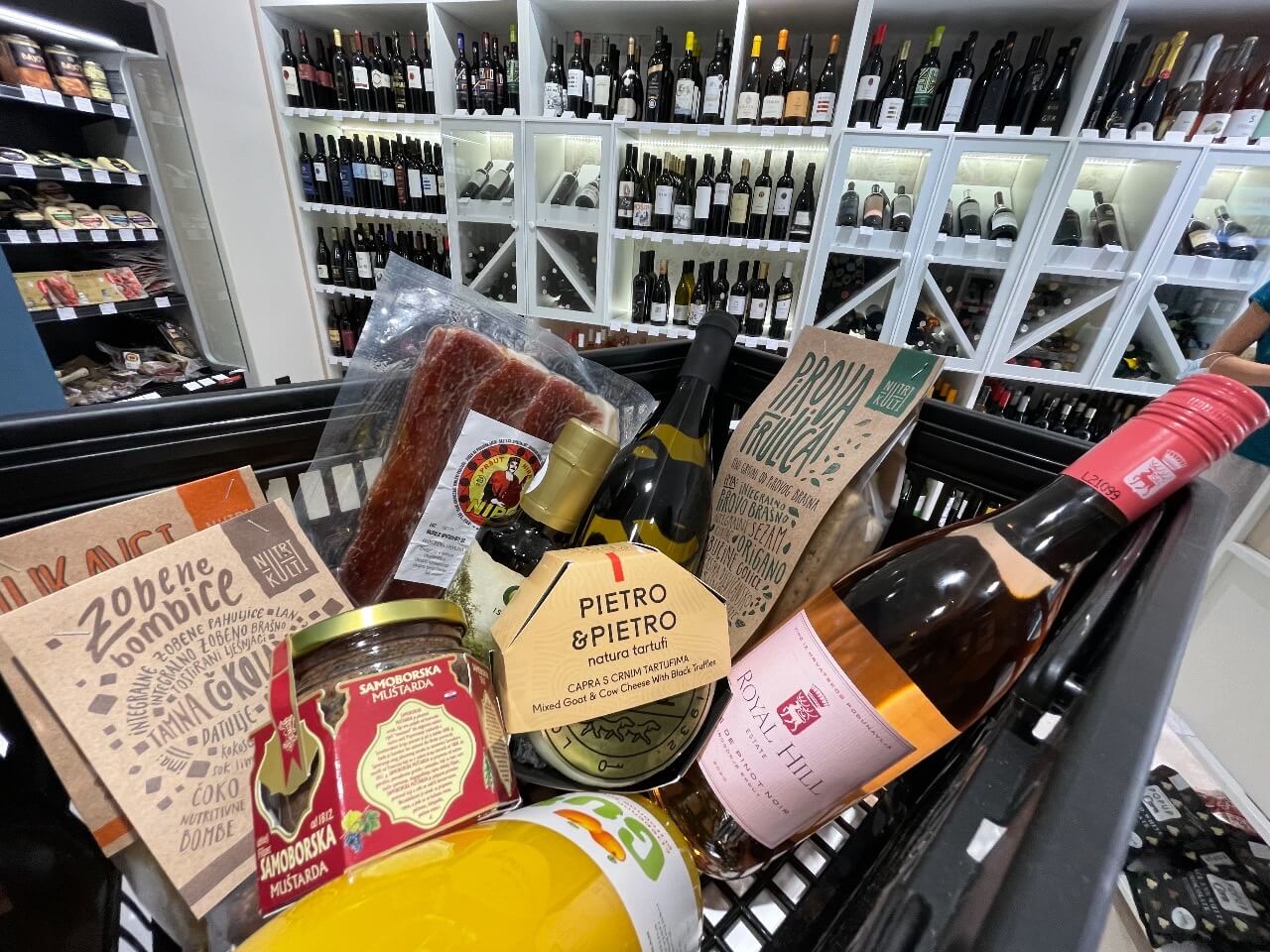Mala Butiga is Dubrovnik’s New Wine and Food Hotspot
27 August 2021 - Mala Butiga is a brand new shop located in the centre of Dubrovnik's historical district. It is the city's newest and one of the most interesting additions when it comes to wine and food offers.
Across the square from the Great Onofrio's Fountain, Mala Butiga offers an amazing selection of Croatian wine and premium food items. It is a family business and a passion project started out of love for all things local and authentic. It is run by locals with plenty of tourism and hospitality experience that includes running a wine bar and making wines. Mala Butiga aims to be a one-stop shop for foodies and wine enthusiasts alike.
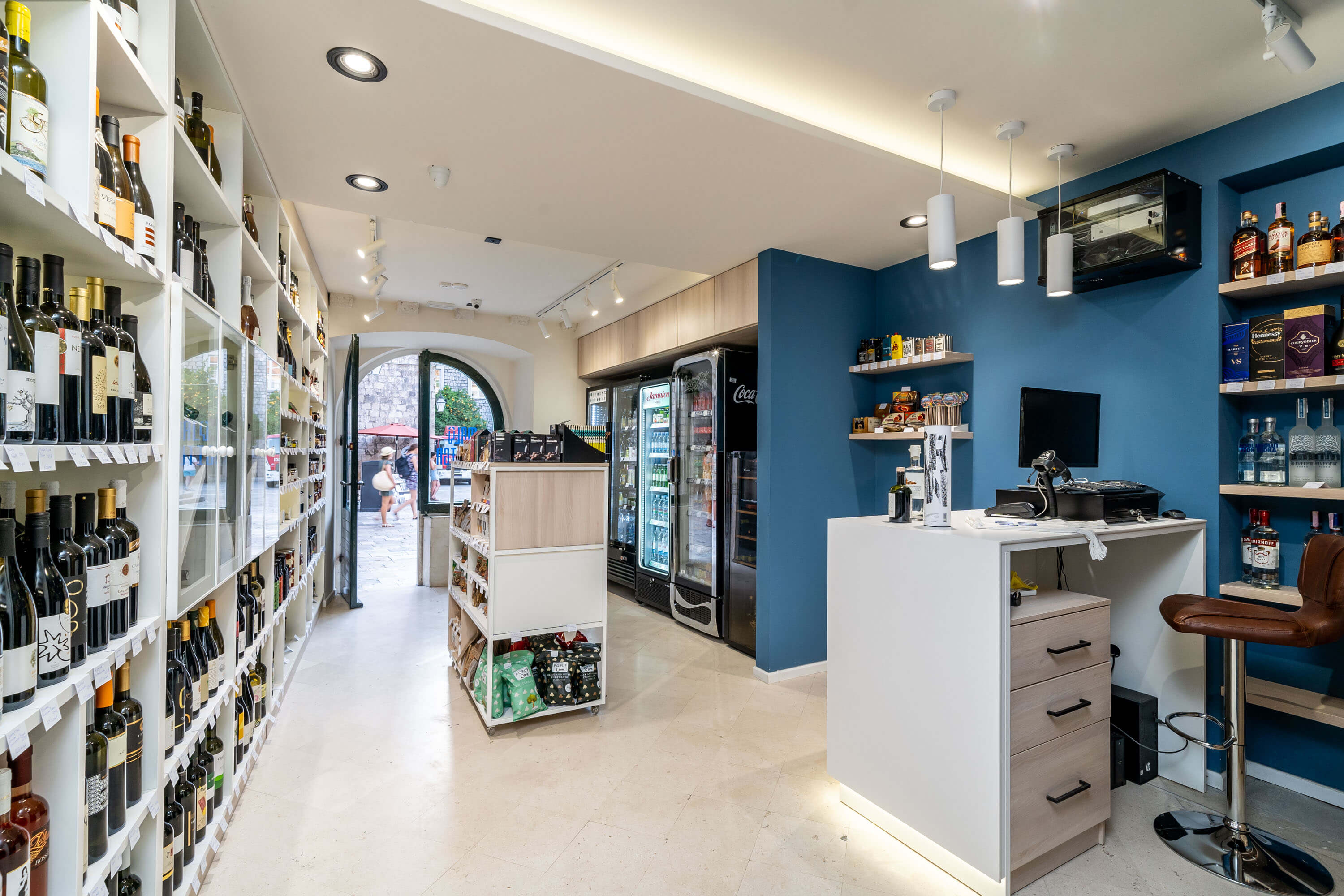
Dubrovnik's historical centre might be brimming with people and activity, but it is hardly a shopper's paradise. There are plenty of options when it comes to stores catering to travellers, but not many offer great quality for a reasonable price. When it comes to local wine and food, the quality of which is one of the major draws for people visiting the area, the situation is not much better. Thankfully, Mala Butiga is here to save the day.
Croatian Wine and Spirits
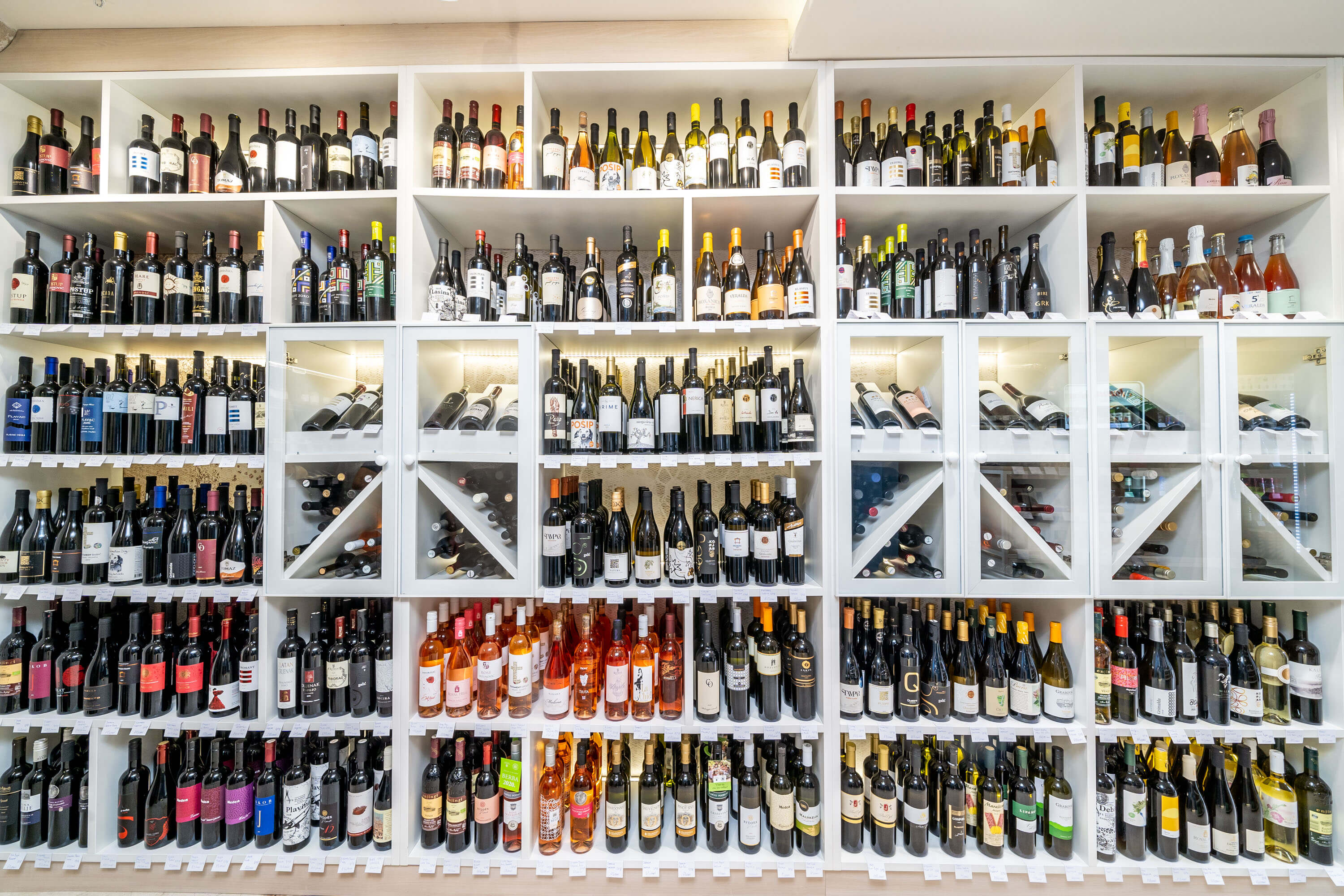
It is a very easy shop to find when entering the historical centre. As you walk through the inner Pile gate, it sits directly behind the prominent fountain to your right. Inside you will find arguably the best selection of wine in all of the Dubrovnik area. Wines sourced directly from local family wineries fall into a wide range of prices and styles. Some of the best Croatian bottles are on display. In a country where almost all the wine is produced on small scale, it took a long time to create this impressive collection. Knowledgeable staff is on hand to help you find that perfect bottle to take home as a memento of Croatia or to enjoy while on holiday with friends or that special someone. Wines from all four major regions of the country are on display, everything from light sparkling wines to full-bodied reds. You can find other spirits at the shop as well with a smaller, but a great selection of craft beer and a lovely offer of Croatian liqueurs waiting for you.
Local Delicacies Not to Miss
When it comes to food items, the deliciousness within is hard to put into words. Truffle specialties from Istria, prosciutto from various Dalmatian regions, top Croatian olive oil, cheese, cured meats, and hot sauces… all this is just a quick visit away. Mala Butiga is stocked perfectly for those last-minute shopping runs before having to entertain a group of friends at home. It is also perfect for creating instant romantic dinners or stocking up for a nice picnic in the local area. Putting together a quick picnic basket was never easier, nor more delicious. In fact, that just might be the perfect choice for a day out while in Dubrovnik. The store holds some items impossible to find elsewhere in Dubrovnik, so its popularity is bound to rise not just with international travellers, but the locals as well.
Mala Butiga is on a fast track towards becoming one of Dubrovnik’s favourite stores. Make sure you pay it a visit before filling up that free space in your luggage for the return flight and we promise you will not be sorry.
For more on lifestyle in Croatia, follow TCN's dedicated page.
For more in-depth information on Dubrovnik, check out our Dubrovnik in a Page section of Total Croatia
Goran Vrabec Best Young Farmer in Croatia
ZAGREB, 21 May 2021 - Goran Vrabec has been named Croatia's best young farmer in 2021, a farmer who owns a family farm in the northwestern region of Zagorje growing chili peppers, and he was presented with the prize by Parliament Speaker Gordan Jandroković on Friday.
Vrabec was chosen from among 21 finalists and along with the first prize, he also won a reward of HRK 25,000, donated by Zagrebačka Banka.
Brankica Borović, whose family-run farm business produces natural, dermatologically tested cosmetics based on immortelle and almond oil, won second prize and HRK 15,000, while wine maker Ivan Gerštajmer Zelember won third prize and HRK 10,000.
The competition for the best Croatian young farmer was organised by Croatian member of the European Parliament Sunčana Glavak, the Agriculture Ministry and the Jutarnji List daily.
The finalists will travel to Brussels for a ceremony at which the best EU farmer will be awarded.
Zagrebačka Banka has secured financial education for the young farmers and will assist them in filling out forms for EU funds, while the Konzum retail chain, which is a sponsor of the competition, will sell their products.
Glavak said that the record high number of applicants showed that young people were very interested in staying in Croatia and its rural areas.
She said that it was encouraging that Croatia would have a record-funds amount of funds from the EU at its disposal, which it will be able to use to improve farm production.
Agriculture Minister Marija Vučković said that Croatia was slightly above the EU average in terms of the number of young farmers, who number 23,228, which is 13.6% of the total number of farmers.
"That is not enough, but the trend is positive and has been rising and we want the share of young farmers to reach 20% with the share of farmers aged above 55 simultaneously going down," she said.
The minister said she was glad that young farmers were increasingly using measures from the Rural Development Programme because it brought structural transformation to rural areas. She noted that agriculture, fisheries and aquaculture could be the real engines of development of Croatia's economy.
Parliament Speaker Jandroković said that he was glad Croatia was above the EU average in terms of the number of young farmers and that he saw hope for development of villages and rural areas in that.
Ample EU funding has evidently helped young people recognise opportunities and realise that country life is often better than life in a city, and that it is possible to make a living from farming, he said.
For more on made in Croatia, follow TCN's dedicated page.
Polish Journalists Learn to Make Zagorje Štrukli And Samobor Kremšnite!
April 1, 2021 - In cooperation with the Polish gastronomic magazine KukBuk, the Croatian National Tourist Board prepared a virtual gastronomic workshop called "Croatia, full of flavor" in Poland where journalists prepared Zagorje štrukli and Samobor kremšnite!
As the Croatian National Tourist Board reports, a virtual gastronomic workshop included 25 prominent Polish journalists. Among the distinguished guests were representatives of the largest Polish state television TVP, the largest private television TVN, editor in chief National Geographic and National Geographic Traveler, leading editors of travel magazines such as the most read WaszaTurystyk and the portals Onet.pl, Wp.pl and Fly4Free.pl, bloggers CroLove and famous Polish gastro bloggers Krytyka Kulinarna and MintaEats.
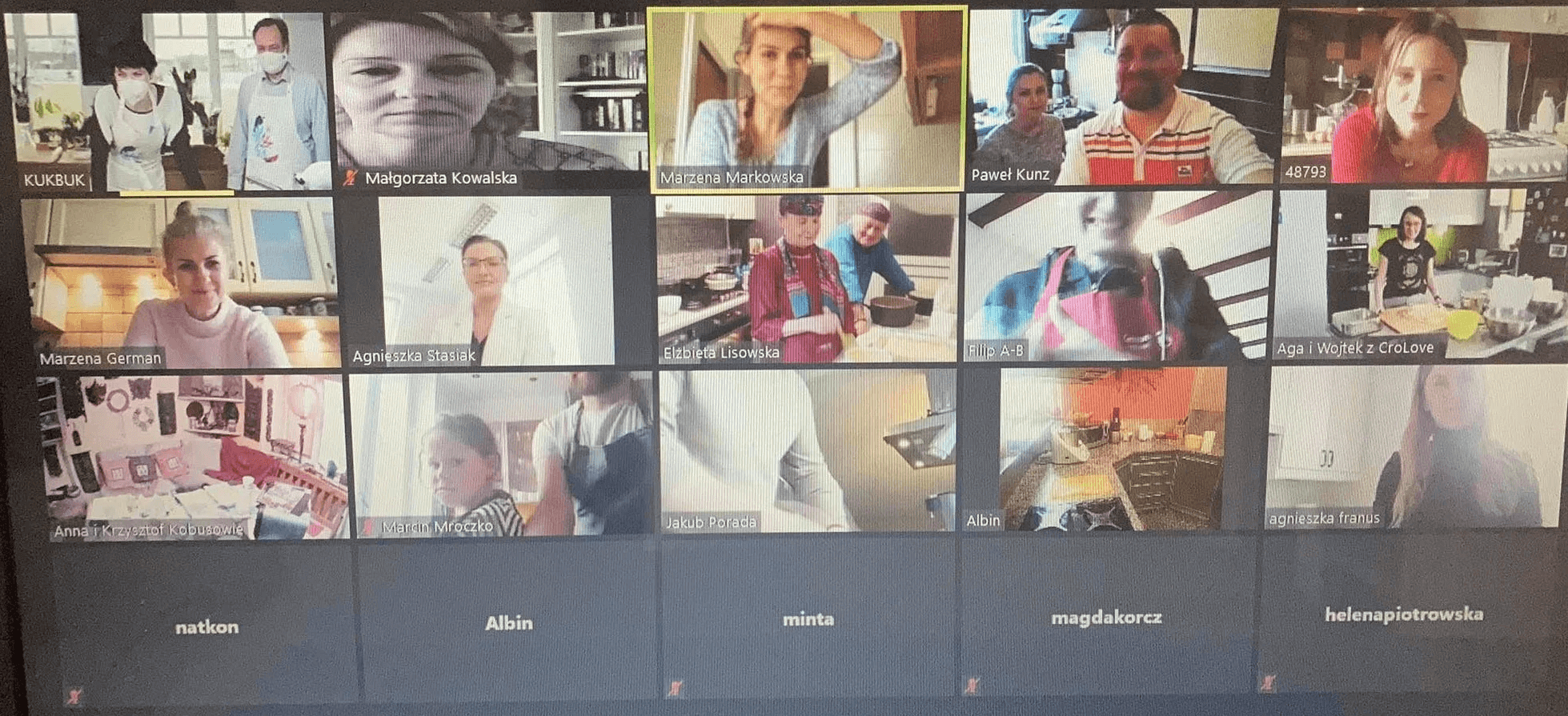
Credits: Croatian National Tourist Board
‘"Thanks to new technologies, we were able to connect with different parts of Poland at the same time and in an innovative and interesting way to promote Croatia as a destination with a rich and diverse gastronomic offer. Our guests were very happy with the idea of cooking together, and the workshop resulted in an even better knowledge of Croatia, always full of extraordinary flavors. Everyone is eagerly awaiting the summer and we hope that with the calming of the epidemiological situation, a large number of Poles will spend their summer vacation in Croatia," said the director of the CNTB Representation in Poland, Agnieszka Puszczewicz.
Due to the current pandemic situation, prominent Polish journalists prepared traditional Croatian specialties in their private kitchens, and the day before they received all the necessary ingredients to mix Zagorje štrukli and Samobor kremšnite with their own hands. Journalists reported their work on social networks with the hashtag in Polish #ChorwacjaPełnaSmaku, which means #CroatiaFullOFlavor. TCN reported about the Samobor kremšnite being awarded the status of Intangible Cultural Good in the following article.
"This is another great promotional move for our dear Poles. All journalists who virtually participated in the workshop and cooked in their home environment under the direction of the great chef Cristina Catese prepared excellent Zagorje štruklji and Samobor kremnšite. I am sure that the Poles will and this year to come to Croatia in large numbers, and we will be ready with all the necessary health measures to ensure a safe and comfortable stay as last year," said Ambassador of the Republic of Croatia to Poland Tomislav Vidosevic, who together with Agnieszka Puszczewicz participated in a gastronomic workshop and prepared Croatian specialties at the Bii Farm.
In a relaxed atmosphere, they also discussed Croatia's plans for this year's season and the current Safe Stay in Croatia project, which promotes Croatia on the Polish market as a safe and desirable destination.
To read more about travel, follow TCN's dedicated page.
Croatia Ranks 4th in Undiscovered Gastronomic Destinations in World
November 17, 2020 – Croatia receives another gastro recognition as the gastro portal Chef's Pencil has declared it as one of the best undiscovered gastronomic destinations in the world.
As Večernji list reports, it is a competition named "The Most Underrated Foodie Destination in the World" conducted among 250 renowned chefs and culinary experts, who singled out under-exposed gastro destinations that can stand alongside popular gastro destinations such as France and Italy.
They selected the top 10 countries that can boast of their gastronomic offer and wealth but are not widely-known as gastro destinations. Croatia took a high fourth place on this list, behind the Philippines, Vietnam, and Mexico. It is followed by Thailand, Peru, Australia, Jamaica, Portugal, and Norway.

Screenshot Chef's Pencil
"Croatia has become a really popular place to holiday over the last few years. And who can blame all those holidaymakers for reaching for pristine Adriatic waters, spectacular beaches, sublime Mediterranean climate, atmospheric Roman ruins, incredible national parks, and soaring mountains… Have I mentioned the food yet? And maybe that’s why it’s an underrated foodie destination – the country has so much going for it, the food has to fight for attention," they say from Chef's Pencil about the Croatian cuisine, noting that it's hard to pinpoint it as it varies from region to region.
"Dalmatian food is typically Mediterranean with lots of fish, veggies, and olive oil. Istrian cuisine is similar although they have their own special approach to beans and pasta here. In Zagreb there’s more of a European vibe with meat and a special attachment to cabbage, while in Slavonia its pork and more pork and lots of paprika," they explain, naming some of the best Croatian food such as sheep's cheese, cured ham, black risotto, octopus salad, brudet, sarma, and more.
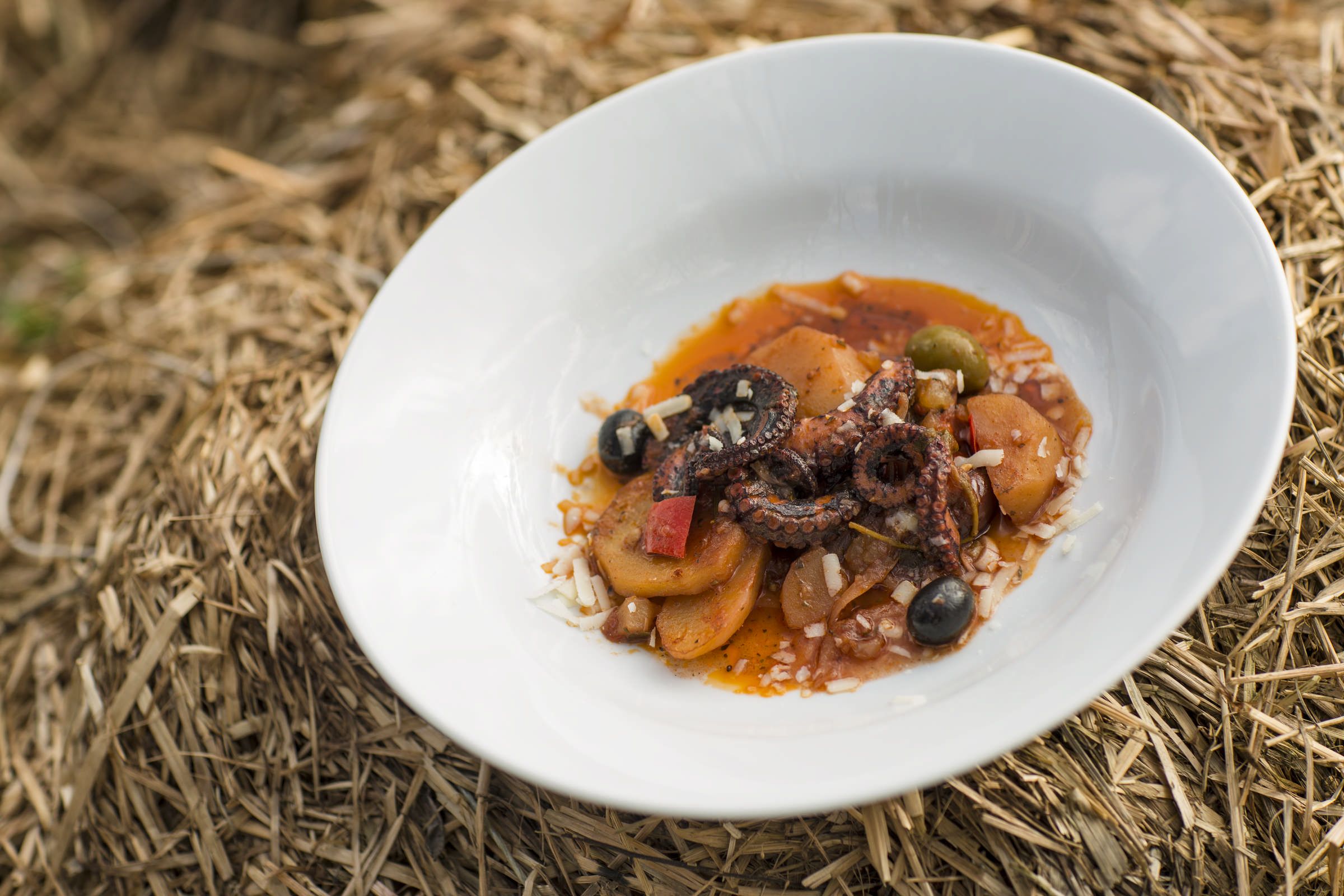
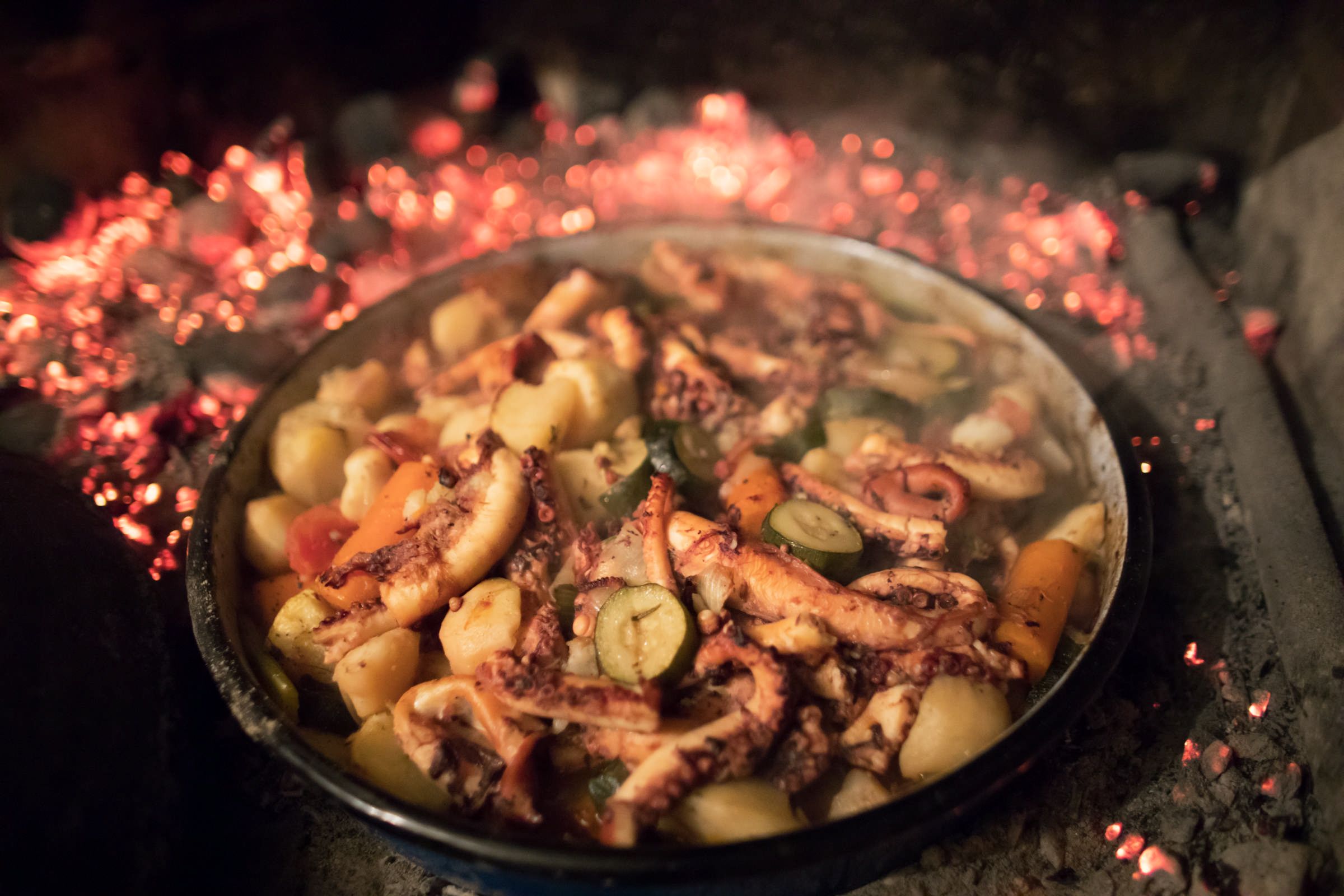
Octopus salad / Copyright Romulić and Stojčić
Although Croatia is already recognized for its gastronomic excellence, offering unforgettable gastronomic experiences for all food lovers, chefs, and experts who participated in the survey believed that our country deserves additional international recognition.
"Recognitions like this give us an additional incentive to continue the development of our gastronomic scene and to continue to promote ourselves as an attractive and quality gastronomic destination, which we really are," said Croatia National Tourist Board director Kristjan Staničić.
Recall, in 2020, the Croatian National Tourist Board presented Croatian gastronomy on this renowned portal, as well as Croatian chefs and regional gastronomic specialties.
Kvarner was presented by the youngest Croatian chef with a MICHELIN star, Deni Srdoč, who shared with readers a recipe for a lamb dish "Heritage lamb". Marko Gajski, the chef of LD Terrace in Korčula, who was also awarded a MICHELIN star this year, presented the Dalmatian region through his original recipe for Komiža bread, while chef Bruno Vokal from Noel, Zagreb's first MICHELIN star restaurant, shared his original recipe for "Deconstructed štruklji". Marina Gaši, chef and owner of the family restaurant Marina in Novigrad, presented the flavors of Istria via sardine tartare. The story of Croatian gastronomy was concluded by Tomica Đukić, chef of the Osijek Hotel and official chef of the Croatian national football team, who presented the rich flavors of Slavonia with a flavored fillet of a black Slavonian pig with pumpkin and beetroot.
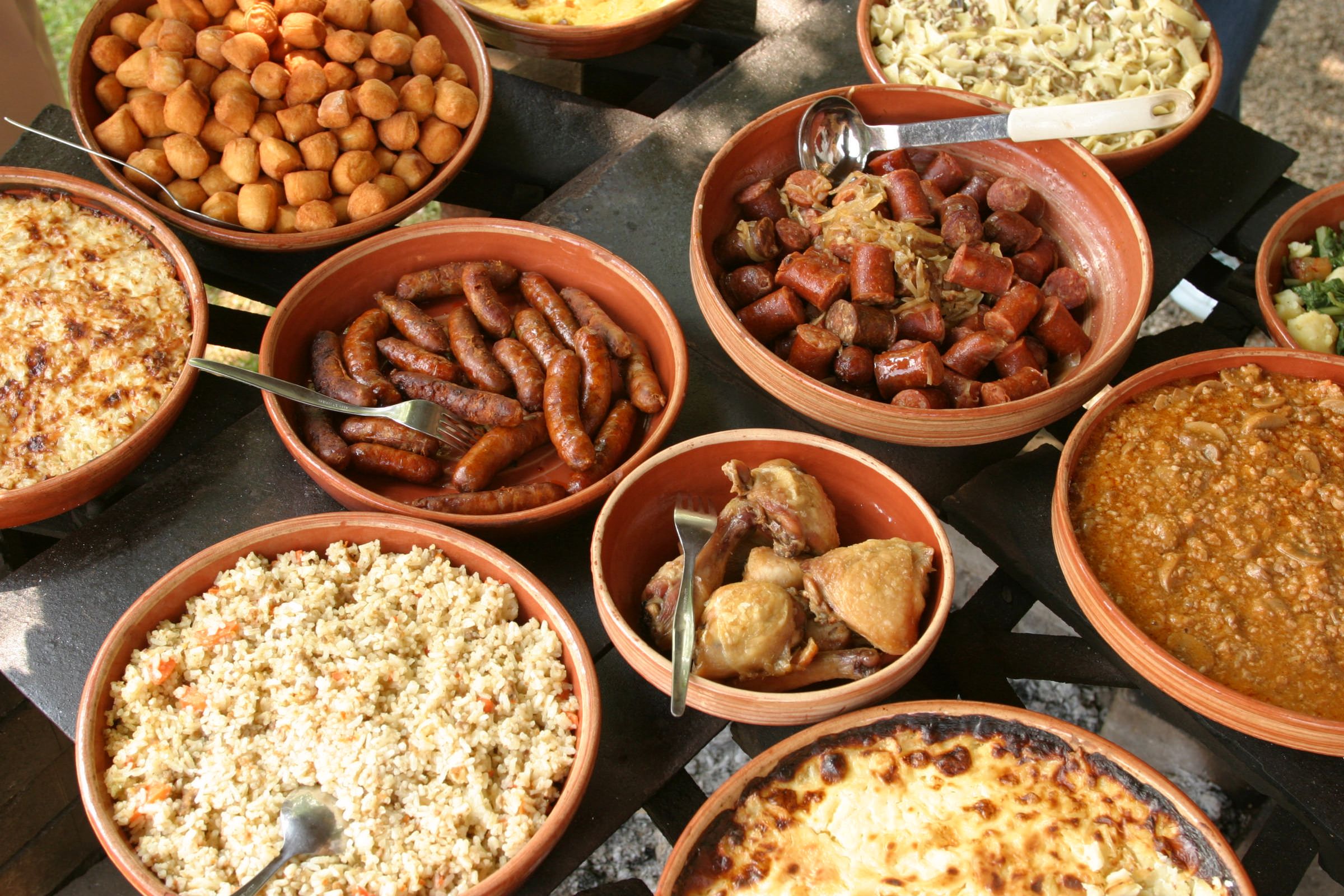
Rich gastronomic offer from Slavonia / Copyright Romulić and Stojčić
Agriculture Ministry Launches Tržnica.hr Platform
ZAGREB, May 5, 2020 - The Croatian Agriculture Ministry has launched an online web platform, Tržnica.hr, which offers farm produce from all over the country, the ministry said on Monday, noting that currently 550 farm producers offer their products via the platform.
The platform has been launched to help farmers and fishermen in the current situation caused by the COVID-19 pandemic.
The platform enables the purchase and sale of domestic produce from all over the country.
Currently buyers can choose between 11 product categories and the number of products on offer is expanded by the day.
Public buyers will be using the platform to find suppliers and announce tenders for the purchase of domestic, fresh and quality food with a short supply chain.
"Even though it has been prompted by the crisis caused by the COVID-19 pandemic, Tržnica.hr is continuation of the process of digitisation of the farming sector," said Agriculture Minister Marija Vučković.
She said the purpose of the online market was to provide citizens with simple and fast access to domestic, fresh and quality products and provide producers with an efficient platform to present and sell their products.
Encouraging domestic production and marketing domestic food products constitutes an important guideline of the national farm strategy that is in the final stage of preparation and will soon be put to public consultation, Vučković said.
More agriculture news can be found in the Business section.
Milanović Visits Meat Factory to Check Risks to Food Supply Chain
ZAGREB, April 21, 2020 - President Zoran Milanović visited the PPK Meat Industry factory in Karlovac to see how the food supply chain was functioning amid the coronavirus crisis, particularly the Pivac Group which together with PPK generates a turnover of about €500 million.
Milanović told reporters that PPK seemed to be coping well with unexpected risks and that if a similar situation were to ever occur again some lessons have been taught.
PPK CEO Igor Miljak said that they showed the president their daily routine in light of the coronavirus crisis, informing him of the lack of raw materials and the number of animals bred which covers only about a half of PPK's needs for raw materials.
The president was told of the high level of safety in the meat processing industry with regard to viruses and bacteria and that everything was being done in line with veterinary and public health standards.
However, checks have been stepped up at the entrance to the factory where workers are tested for body temperature and if there were to be any anomalies with a worker or their families or friends they would be relieved from the production line. Distance between workers is maintained and shift work has been introduced, Miljak said, stressing that so far not one worker has been infected.
PPK did not record a decrease in production in March and April as households increased their stocks, or at Easter when more meat is traditionally produced, he added. A decrease in production can be expected if the tourism season is affected.
Miljak explained that when the crisis emerged there were some difficulties with the supply of raw materials, yet deliveries were maintained. However, with a threat of the borders being closed, Croatia's lack of self-sufficiency in raw materials became obvious.
PPK has 560 employees. There have not been any lay-offs nor should there be in the foreseeable future. The company exports about 10% of its production, Miljak said.
Milanović said that Croatia needs to start making political decisions and not those based on expertise. At first Croatia responded instinctively to the outbreak of coronavirus, as did most of the world.
"Today we know a lot more about the disease than we did two weeks ago and some decisions need to be made at the political level and not by experts," said Milanović.
More coronavirus news can be found in the Lifestyle section.
Food Prices Influenced by Demand and Economic Downturn
ZAGREB, April 12, 2020 - Global economy is slowing down, causing a drastic fall in prices of food on the global market, however, the trend has still not emerged on the Croatian market, shows an analysis by the Smarter consulting firm on the impact of the corona crisis on food price trends.
Nevertheless, the analysis shows that consumers in Croatia are starting to spend more rationally, fearing for their household budget after an initial increase in demand caused by fear of shortages.
Smarter notes that the latest data from the Market Information System in Agriculture (TISUP), which monitors price developments on a weekly basis, show that, compared to March 2019, prices for some categories of meat, especially pork, were up by around 10%.
Considerable price fluctuations were also registered in some fruit and vegetable categories - from around 10% for lettuce to around 40% for green onions, the analysis shows.
Smarter consultants believe that the stabilisation of prices was influenced by a government decision to limit price increases for certain foods, adopted at the start of the corona crisis. They emphasise that the measure was the trigger which prevented drastic price increases due to increased consumption, as a result of the fear of shortages.
"We estimate that, after the drastic increase in demand due to the fear of isolation, stock-piling and panic buying, the situation has stabilised," Smarter notes.
Influenced by the crisis which has already resulted in layoffs and closure of restaurants, hotels, and coffee shops, and having to stay home, consumers fear for their household budget and are spending more rationally. In other words, they worry if they will have enough money for the post-corona period, analysts note.
The analysis shows that the crisis caused by the coronavirus epidemic has led to new trends in supply.
"Due to the measures introduced, there has been an explosion of online purchases and deliveries of fruit, vegetables, and other foodstuffs," Smarter says, noting that various drive-in markets, support groups, and Facebook groups are offering products delivered to the consumer's doorstep.
Although this type of selling is modern and is working at the moment, because consumers are shut in at home due to the epidemic, Smarter thinks that this is a short-term solution which makes goods more available to consumers and enables domestic producers to sell their goods, as they cannot sell it on farmers' markets due to the current restrictions.
Most consumers, especially older persons, still prefer buying from the shelves in retail chains, say Smarter analysts, who also think that retailers should pay attention to the safety of goods they are offering.
Smarter estimates that Croatian consumers will soon feel a financial strain, as economic activities have slowed down or halted completely, which consequently leads to layoffs, pay reductions, delays in payment of goods and services, etc.
That is why it is important to act right away, so that goods, and especially such goods as fruit and vegetables, are purchased and placed on the market via safe and verified supply chains, experts at Smarter think.
They also think that an about-turn is necessary in agricultural policies to make them focus on higher production business models, raising the level of self-sufficiency, producers' forming associations, and on establishing purchase centres where larger quantities of goods can be gathered and sent to consumers.
Smarter is a consulting firm specialising in the agricultural and food sectors.
More economy news can be found in the Business section.
60th Anniversary of Vegeta Spice Celebrated
ZAGREB, December 17, 2019 - A ceremony marking 60 years of production of internationally renowned Croatian spice brand Vegeta was held in the Podravka company in Koprivnica on Monday.
In attendance were Prime Minister Andrej Plenković and Parliament Speaker Gordan Jandroković as well as numerous ministers.
Plenković congratulated the hosts "on Vegeta's first 60 years," saying that the spice, aside from being part of Podravka's identity, was also part of everyone's everyday life.
"I also congratulate Podravka on its excellent business results as well as on your employees' excellent salaries," he said, praising the quality of Podravka's other products.
Jandroković said the 72-year-old Podravka was the pride of the Croatian economy. "It adapts to global trends and is also an innovative company," he said, recalling that the company with 1,800 employees had a line of as many as 1,000 products.
Speaking of Vegeta, Podvarka Board chairman Marin Pucar said it was invented by professor Zlata Bartl and her team. "It was such a big invention that even global multinational companies, after Podravka, decided to launch similar products."
Vegeta is Croatia's most successful brand and is sold on 50 markets around the world.
More news about Podravka can be found in the Business section.
Over 300,000 Tons of Food Thrown Away by Croatian Households Annually
ZAGREB, December 8, 2019 - More than 300,000 tons of food is thrown away by Croatian households annually, while at the same time organisations try to incite solidarity with the hundreds of hungry and homeless people.
A survey whose findings were recently published in the Waste Management journal confirmed data that, on average, 75 kg of food per capita is thrown away in Croatia annually, as against 92 kg in Europe.
The survey was conducted in 2017, covering 115 Croatian households. It showed that many of them did not realise how much food they threw away.
Researcher Branka Ilakovac says households account for 77% of the 380,000 tons of food waste in Croatia, as against a little over 50% in Europe.
Eighty-eight million tons of food is thrown away in Europe and 1.3 billion worldwide.
In Croatia, fruit and vegetables account for 46% of food waste. Egg shells, tea leaves and coffee grounds account for 12%, bread and pastries for 9%, potatoes for 8% and meat for 7%. Pasta, rice and dairy products account for the least food waste, 4% each.
Households with more children throw away more pasta, rice and dairy products, while larger households throw away more meat, potatoes, bread, pastries, pasta and rice.
More educated respondents throw away less potatoes, pasta and rice, and those with higher incomes throw away more cakes, milk and dairy products.
An earlier survey showed that nearly half of respondents believed that too much food prepared for a meal was the main cause of food waste, while 29% felt the cause was the purchase of too much foodstuffs.
In order to reduce food waste, one-third of respondents fed it to their dog or cat, while a little over 25% tossed it in the trash, says Ilakovac.
It turns out that the shortcomings of waste management also contribute to food waste as a majority of respondents said they did not have an organised system for the collection and transport of biological waste.
There is room and need to further educate people about sorting waste because we have lost a lot of time, Ilakovac says.
Caritas Croatia has been trying for years to replace the practice of throwing food with donating it. As a result, regulations on food donation were amended in September to eliminate obstacles and make it easier to donate food.
Marija Batinić Sermek of the Agriculture Ministry says donors can donate food even after its best-by date and that they are eligible for tax breaks until the best-by date.
Boris Peterlin of Caritas Croatia agrees that the law is important but says the most important thing is "whether food is donated from the heart."
Household food waste can be reduced via prevention, Ilakovac says, by buying only as much as we need, and not more as is the case now, and by not buying new food until we have consumed the food we have.
Donation works for big retail chains, not only for food near its best-by date or food that has arrived in the stores but also food in warehouses because the chains are aware they will not be able to sell all, Ilakovac says.
She has founded the Food Waste Prevention Centre which is focused on households which, she says, need help with this.
People don't realise they throw away food because they have been doing it all their lives, Ilakovac says, adding that the relationship with food is not at all technical but first and foremost a question of a society's maturity, a society which is responsible towards goods and the environment and shows solidarity.
More food news can be found in the Lifestyle section.
MI Braća Pivac Buys Kraš ESOP Shares, Holds Controlling Stock
ZAGREB, November 23, 2019 - The Braća Pivac meat industry (Pivac Brothers Meat Industry) and the Kraš-ESOP (Employee Stock Ownership Plan) on Saturday concluded a sales agreement on the transfer of ESOP shares in the largest Croatian manufacturer of confectionery products to the Braća Pivac, the Zagreb-based Kraš stated today.
Under the agreement. MI Braća Pivac company purchased 276,441 ordinary shares, that is 18.44% interest, from Kraš small shareholder, at the price of 861.20 kuna per share or 238.1 million kuna for the whole transaction.
The price corresponds to the weighted average price of the Kraš share on the Zagreb Stock Exchange (ZSE) in the last three months.
The deal was achieved after the Kraš ESOP held a general assembly on Saturday morning when it instructed the management on negotiations with potential buyers.
Apart from the agreement on the shares transaction, also an agreement on social partnership between the Braća Pivac company, Kraš workers and the trade union of workers in agricultural and food producing industries (PPDIV) was concluded defining the obligations of MI Braća Pivac for further investments in Kraš, protection of the rights of the Kraš employees and the maintenance of the existing production plants at the same locations.
MI Braća Pivac management board chair Ivica Pivac was quoted as saying that the group sees Kraš as one of the up-and-coming producing companies in Croatia and that the new owner would like to advance the production of this sweets manufacturer.
He said that he was glad that workers recognised the Pivac group as a steady partner for Kraš.
Today's acquisition makes the Pivac group one of the biggest food producing companies in southeast Europe and some 5,000 employees are on its payroll.
More news about Kraš can be found in the Business section.


